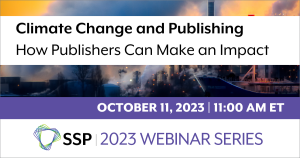Our 2023 webinar series continues with “Climate Change and Publishing: How Publishers Can Make an Impact,” happening Wednesday, October 11, at 11 am EDT. Registration for the event remains open with a discount available for SSP members.
Publishers have the credibility and resources to play a key role in expediting the trajectory of climate change research globally by placing this important work front and center for decision-makers at both the international and regional levels. They also have the opportunity to lead by example via their own solutions to the problems that climate change may pose directly to the industry.
Moderators Clark Holdsworth (Senior Manager, Communications & Partnerships, Accdon LLC/LetPub) and Mia Ricci (Director, Publications, American Geophysical Union) will lead a rich discussion among speakers Graham Butterfield (Head of Journals, Frontiers), Alyssa Findlay (Senior Editor, Nature Climate Change), and Kris Karnauskas (Editor, Geophysical Research Letters; Assoc. Prof., University of Colorado) about the varied avenues by which scholarly publishers can engage with their audiences on climate change research.
Learn more about next week’s webinar:
Who is the intended audience and why should they attend?
(Clark) Authors, journal staff, university administration, and society leadership all face challenges in timely and effective research dissemination, particularly where events demand expediency and communication with diverse stakeholders, such as policy makers. The lessons learned from the dissemination of climate research during an era of acute attention on climate change offer significant value to this audience.
Why do you think this topic is important and timely?
(Clark) Climate change is a somewhat unique research area in the sense that the topic is not simply another field that we contribute to as publishing professionals. The research we work so hard to publish also informs on the challenges and impacts that the scholarly publishing industry is likely to experience as a result of climate change. Climate science is a single, but significant, field of research where dissemination is regarded as integral to solving an issue that is characterized by substantial social and political urgency and investment. It is, however, not unique. Lessons and discussion on this particular topic of research dissemination likely carry over to the larger issue of shifting urgency or emphasis across a range of fields, which is certain to require responsiveness from the scholarly publishing community—think of COVID as one of the other many examples contained in this larger issue facing scholarly publishing.
What do the selected speakers bring to the discussion?
(Kris) I’ve been studying climate change in various ways for most of my career. My education all the way back to undergrad was in the atmospheric/oceanic sciences. I’ve published nearly 100 peer reviewed journal articles, and the majority of them have something to do with climate variability and change. As a professor, I also go into the classroom a few times a week and try to help the next generation of adults, industry leaders, voters, etc. understand the science.
On the other side of it all, I’ve served as an editor for journals in this field since 2007, including JGR-Oceans, Geophysical Research Letters, and PLOS Climate. The first two journals are known as “society” journals, in that they are ultimately governed by a professional organization in my field (AGU) but partnered with a big publisher (Wiley).
In recent years, in my capacity both as a journal editor and an individual scientist, I have expended energy trying to support open access and open science. I plan to talk a fair bit about that aspect in this webinar.
I recently gave some remarks on a similar webinar (hosted by OASPA), and these were my key points. I will do some adapting for this, but there will be significant overlap.
· We are conducting a massive, uncontrolled experiment with Earth’s climate right now.
· Compared to COVID19, the pace of climate change is slower, and the effects are easier to ignore.
· The climate crisis cannot be adequately addressed if our collective and rapidly-evolving knowledge is hidden behind paywalls, or if we have to email strangers to get the data.
· The entire climate research enterprise depends critically on open science (particularly open data), and relatively speaking, it’s a great time to be a climate scientist!
· Open data policies of journals, funding agencies, etc. are helpful, but enforcement is still complicated.
· Physical climate science (my field) seems to be relatively slow to embrace open access.
· In terms of open access (to peer-reviewed research articles), we can and must do better. It may require some cultural changes within the academia.
(Alyssa) I bring the perspective of a professional full-time editor who no longer actively engages in research. In this capacity, I draw on my (and my team’s) experience publishing climate change research across all scientific disciplines. My talk will address what journals can do to support the dissemination of climate change research to different audiences, including interdisciplinary studies, what journals can do to encourage a diversity of voices in the climate change debate and how publishers can support editors to support climate researchers.
(Graham) Graham brings his 20+ year career in publishing in a number of different roles and most recently leading the Sustainability Portfolio in Frontiers which comprises a wide range of titles including Frontiers in Sustainability, Frontiers in Sustainable Food systems and Forets & Global Change
What do you hope attendees will take away from the event?
(Clark) Actionable items for better disseminating climate change research, and an understanding of the opportunities for publisher solutions to the problems that climate change may pose directly to the industry.
Thank you to our 2023 education sponsors Morressier, Silverchair, Taylor & Francis/F1000, and 67 Bricks.
News contribution by SSP member Rick Anderson. Rick is a University Librarian at Brigham Young University.



Join the Conversation
You must be logged in to post a comment.